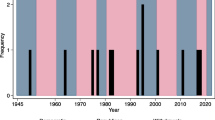Abstract
Prima facie, the pursuit of national interest stands in contradiction with the rules of global justice. Indeed, the former relies upon selfishness and the maximization of national utility, while the latter presupposes distributive measures at the global level that exercise some constrain on state behavior. However, these two notions are open to interpretation and, sometimes, even lack clarity. This paper will look for clarification and will ask whether it is possible to go beyond the radical difference between those two logics. I will start by underlining the reasons why the national interest and global justice are in contradiction with each other. Although they are not commensurable, the paper will then argue the two can be compatible in specific equilibriums of international politics, I will refer to as the “rationalist” and the “revolutionist” modes. Finally, the paper will discuss whether, in the best of all possible worlds, we should strive for this compatibility.
Similar content being viewed by others
Notes
As I will show in the paper, although we can trace the roots of the Realism/Idealism dispute back in Europe and notably in Germany, both frameworks, the National interest and Global justice, as well as their dyadic relation, originate, essentially, in the US (and to a much lesser extent in the UK). They are constitutive parts of the IR academic debate and mirror the history of US foreign policy.
Whether they can be of any use at all in a non-western context is also a legitimate question.
On moralism and the political, see also Williams (2005).
According to Bismarck, states are able to understand the nature of their interests and “no leader will risk the survival of his country to obey international law”.
According to Thucydides, Athens’s policy of building alliances and developing its armament was the “cause” that led to Sparta’s attack.
With the exception of Mearsheimer, most signatories of this declaration were “defensive” realists.
Collective bodies are different from individuals. On reputation in the field of international politics, see Mercer (2010).
This is consistent with Waltz’s neo-realist explanatory framework. See Sagan and Waltz (1995).
I define here as “goods” the ideas and values, as well as the different sets of practices that the National interest and Global justice inspire or are the reflection of.
Some states might benefit from resources distributed according to global justice principles. However, even for poor countries, their policies could be affected in other areas such as security or environmental policy.
According to James Rosenau the national interest relies on elusive criteria and is “plagued by the absence of criteria for cumulating the interests once they have been identified” (Rosenau 1971, 243).
To these criteria “better than,” “worse than” and “equally good”, Chang adds another criteria: It is neither true or false that they stand in a positive value relation (indeterminacy).
Grotius, himself, grants special rights to powerful states that have the responsibility to save populations that are unjustly attacked, i.e., the former could lead preventive wars if they are threatened (Grotius 1925, 167).
There is a large literature in IR on transnational actors, norms entrepreneurs and states. Some focus on the question of economic justice (O’Brien et al. 2000). In normative theory, some philosophers have tried to reconcile states’ interests and goals with global justice concerns, for example, in the area of migration studies (Miller 2007).
In the case of chemical weapons, see Price (1997).
This would be an explanation of state behavior. Eventually, liberal internationalists and constructivists would make a similar normative argument there: States should include global justice in their soft power policy.
The equilibrium between hard power and soft power is contextual. As opposed to Clinton’s presidency, the Bush administration focused more on hard power. President Obama tried to restore soft power (and who knows what the actual president’s views are concerning soft power). Whether this equilibrium between hard power and soft power and between the national interest and global justice makes sense in a non-Western environment such as China is a question we may ask at this conference.
When trying to explain what the Bush doctrine was, Condoleeza Rice wrote that “the old dichotomy between realism and idealism has never applied to the United States” (Rice 2008, 25). In the Obama administration, John Kerry stated that US foreign policy achieves greatness “only when it has combined realism and idealism”. See Snyder (2009). The combination of realism and idealism is, for the US, a true “alignment of planets”.
Indeed, the notion of interest gave rise to international society of states (Kratochwil 1982, 25).
My argument relies here upon the compatibility of the explanation of national interest policies from a rationalist perspective and consequentialism as a normative model.
This shift could happen if we expose the invalidity of the utilitarian based non-compromising model.
See above.
See the previous section.
Moral and normative revolutions happen. See Appiah (2010).
These two concepts come from IR constructivist theory.
Those negative consequences such as identity crises and populism mentioned above are also to be considered as costs.
We may think about one may seem a simple example, the nuclear regime. A priori, the logic of state interest (“the logic of consequences”) prevails over global justice claims (“the logic of appropriateness”). However, individuals may agree with the balance of nuclear power. Nuclear weapons should be an impediment to war.
References
Alison, Graham. 2017. Destined for War: Can America and China Escape the Thucydides’s Trap. New York: Houghton Mifflin.
Appiah, Anthony. 2010. The Honor Code: How Moral Revolutions Happen. New York: Norton.
Beitz, Charles. 1979. Political Theory of International Relations. Princeton: Princeton University Press.
Beitz, Charles. 2005. Cosmopolitanism and Global Justice. The Journal of Ethics 9: 11–27.
Brooks, Thom (ed.). 2008. The Global Justice Reader. Oxford: Blackwell.
Carr, E.H. 1937. The Twentieth Years Crisis, 1919-1939. London: Macmillan.
Chang, Ruth (ed.). 1997. Incommensurability, Incomparability and Practical Reason. Cambridge: Harvard University Press.
Chang, Ruth. 2013. Incommensurability (and Incomparability). In The International Encyclopedia of Ethics, ed. Hugh La Follette. Malden, MA: Wiley-Blackwell.
Coker, Christopher. 2005. The Improbable War: China, the United States and the Logic of Great Power Conflict. Oxford: Oxford University Press.
Colonomos, Ariel. 2008. Moralizing International Relations—Called to Account. New York: Palgrave.
Colonomos, Ariel. 2016. Selling the Future—The Perils of Predicting Global Politics. London and New York: Hurst and Oxford University Press.
Colonomos, Ariel. 2017a. A Cooperative Globalist Approach to the Hostage Dilemma. In Soft War the Ethics of Unarmed Conflict, ed. Michael Gross and Tamar Meisels, 184–199. Cambridge: Cambridge University Press.
Colonomos, Ariel. 2017b. Proportionality as a Political Norm. In Weighing Lives in Warfare, ed. Larry May, Claire Finkelstein, and Jens David Ohlin, 217–240. New York: Oxford University Press.
Davis, Kevin, Angelina Fisher, Benedict Kingsburry, and Sally Engle Merry (eds.). 2012. Governance by Indicators Global Power Through Quantification and Rankings. New York: Oxford University Press.
Grotius, Hugo. 1925. The Law of War and Peace. Oxford: Clarendon Press.
Herz, J. 1950. Idealist Internationalism and the Security Dilemma. World Politics 2 (2): 171–201.
Hobbes, Thomas. 1963. Leviathan. London: Reading and Feakenham.
Jervis, Robert. 1970. The Logic of Images in International Relations. New York: Columbia.
Jervis, Robert. 1978. Cooperation Under the Security Dilemma. World Politics 30 (2): 167–214.
Kratochwil, Friedrich. 1982. On the Notion of ‘Interest’ in International Relations. International Organization 36: 1.
Lang, Anthony (ed.). 2004. Political Theory in International Affairs: Hans Morgenthau on Aristotle’s Politics. Prager: Westport.
Mercer, Jonathan. 2010. Reputation & International Politics. Ithaca: Cornell University Press.
Miller, David. 2007. National Responsibility and Global Justice. Oxford: Oxford University Press.
Morgenthau, Hans. 1946. Scientific Man vs. Power Politics. Chicago: Chicago University Press.
Morgenthau, Hans. 1948. Politics Among Nations. New York: MacGraw Hill.
Morgenthau, Hans. 1951. In Defense of the National Interest: A Critical Examination of America’s Foreign Policy. New York: Knopf.
Morgenthau, Hans. 1965. Vietnam: Shadow and Substance. New York Review of Books, September 16: 3–5.
O’Brien, Robert, Anne Marie Goetz, Jan Aart Scholte, and Marc Williams. 2000. Contesting Global Governance: Multilateral Economic Institutions and Global Social Movements. Cambridge: Cambridge University Press.
Price, Richard. 1997. The Chemical Weapons Taboo. Ithaca: Cornell University Press.
Rawls, John. 1999. A Theory of Justice. Cambridge: Cambridge University Press.
Rice, Condoleeza. 2008. Rethinking the National Interest: American Realism for a New World. Foreign Affairs 87 (4): 2–26.
Rochester, J.Martin. 1978. The ‘National interest’ and Contemporary World Politics. The Review of Politics 40 (1): 77–96.
Rosenau, James. 1971. The Scientific Study of Foreign Policy. New York: Free Press.
Sagan, Scott, and Kenneth Waltz. 1995. The Spread of Nuclear Weapons—A Debate. New York: Norton.
Shapiro, Ian. 2007. The Flight from Reality in the Human Sciences. Princeton: Princeton University Press.
Snyder, Jack, 2009. One World, Rival Theories. http://foreignpolicy.com/2009/10/26/one-world-rival-theories/. Accessed 7 Dec 2018.
Swedberg, Richard. 2005. Interest. Verlag: Open University Press.
Thucydides. 2000. The Peloponnesian War. London: Penguin.
Walt, Stephen. 1998. One World Many Theories. Foreign Policy. Spring.
Waltz, Kenneth. 2012. Why Iran Should get the Bomb—Nuclear Balancing Would Mean Stability. Foreign Affairs 91: 2–5.
Weber, Max. 1993. The Sociology of Religion. Boston: Beacon Press.
Wendt, Alexander. 2003. Why a World State is Inevitable. European Journal of International Relations 9: 4.
Wight, Martin. 1991. International Theory—The Three Traditions. London: RIIA.
Williams, Bernard. 2005. In the Beginning was the Deed—Realism, Moralism in Political Argument. Princeton: Princeton University Press.
Author information
Authors and Affiliations
Corresponding author
Rights and permissions
About this article
Cite this article
Colonomos, A. The National Interest and Global Justice: Contradictory Terms, Incomparable and Non-commensurable Goods, Yet Compatible?. Fudan J. Hum. Soc. Sci. 12, 233–253 (2019). https://doi.org/10.1007/s40647-018-0247-6
Received:
Accepted:
Published:
Issue Date:
DOI: https://doi.org/10.1007/s40647-018-0247-6




